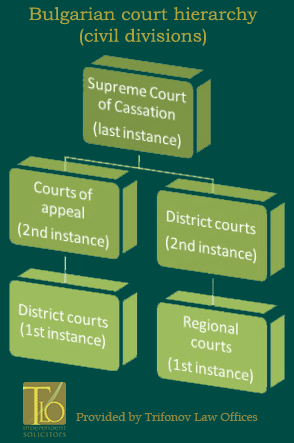In Bulgarian civil court system hierarchy there are 3 levels:

The general rule is set by Art.103 of the new Bulgarian Civil Procedure Code which states that all civil cases, except for those within the jurisdiction of the district court as a first instance, shall be under the jurisdiction of the regional court. The regional courts are the lowest level of Bulgarian judicial system.
On the next level in Bulgarian judicial hierarchy are the district courts. They act as second instance courts for appeals against decisions of regional courts. But they are also first instance for some more complicated cases:
- Claims for ascertaining or contesting origin, for termination of an adoption, for depriving from legal ability or for cancellation of the deprivation;
- Claims of ownership or other real rights over a property with a price of the claim over 50 000 leva;
- Claims of civil and commercial lawsuits with a price of the claim over 25 000 leva, except for the claims for maintenance, on labour disputes and for receivables from deficiency acts;
- Claims to find that an entry is inadmissible or null and void, as well as that an entered circumstance does not exist, if this provided by a law;
- Claims, which under other laws are subject to hearing by the district court.
Sofia is the only exception to have 2 same level courts – the Sofia City Court (for those based in the city of Sofia) and the Sofia District Court (for all based around Sofia).
Bulgarian courts of appeal act as second instance for cases heard in a district court as first instance.
If the first instance has been one of the lowest level courts (regional) then second instance court should be the respective district court.
Another very important question is: which out of many same level courts should the claim exactly be filed in? The answer to this question is in Art.105 of the Civil Procedure Code: The claim shall be filed in the court, within whose region is the permanent address or the seat of the defendant. To put it simply – it is important who exactly the claimant will be taking to court. If for example one has to sue a company that has built some property in the town of A and has an office in the town of B but at the same time is based in the town of C – then the claim should be filed in the C courts (regional or district).
There are a few very important exceptions though.
First of all – claims for property right over real estate, for partition of joint ownership over a real estate, for boundaries and for defense of a violated possession of a real estate, shall be submitted at the place where the estate is located. At the place where the estate is located also claims for concluding a final contract of establishment or transfer of property rights over a real estate, as well as for termination, cancellation or declaring null and void of property rights over real estate contracts shall be submitted. It is also very important for one to know that not all real estate civil cases fall under this category.
The second big exception is regarding all tort claims – they may also be submitted at the place of commission of the harmful act. Please note that they could also – depending entirely on the claimant’s decision – be filed in the court where the defendant is residing or based.
And the last of those 3 is the contractual jurisdiction – according to Art. 117 of Bulgarian Civil Procedure Code:
The parties involved in a property dispute may state in writing another court, different from the one, under whose jurisdiction the lawsuit is as per the rules of the jurisdiction by location. This provision shall not be applied to the jurisdiction under Art. 109.





